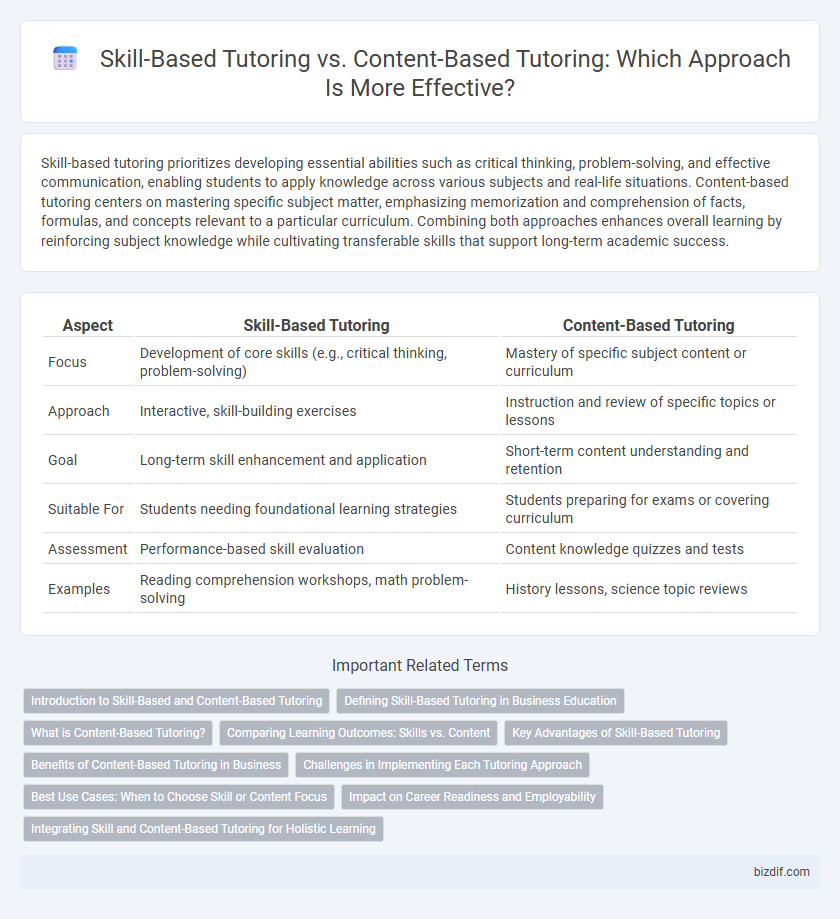Skill-based tutoring prioritizes developing essential abilities such as critical thinking, problem-solving, and effective communication, enabling students to apply knowledge across various subjects and real-life situations. Content-based tutoring centers on mastering specific subject matter, emphasizing memorization and comprehension of facts, formulas, and concepts relevant to a particular curriculum. Combining both approaches enhances overall learning by reinforcing subject knowledge while cultivating transferable skills that support long-term academic success.
Table of Comparison
| Aspect | Skill-Based Tutoring | Content-Based Tutoring |
|---|---|---|
| Focus | Development of core skills (e.g., critical thinking, problem-solving) | Mastery of specific subject content or curriculum |
| Approach | Interactive, skill-building exercises | Instruction and review of specific topics or lessons |
| Goal | Long-term skill enhancement and application | Short-term content understanding and retention |
| Suitable For | Students needing foundational learning strategies | Students preparing for exams or covering curriculum |
| Assessment | Performance-based skill evaluation | Content knowledge quizzes and tests |
| Examples | Reading comprehension workshops, math problem-solving | History lessons, science topic reviews |
Introduction to Skill-Based and Content-Based Tutoring
Skill-based tutoring targets the development of specific abilities such as critical thinking, problem-solving, and time management to enhance overall learning performance. Content-based tutoring emphasizes mastering subject matter knowledge, focusing on curriculum-driven topics like mathematics, science, or language arts. Both approaches offer tailored educational support, with skill-based tutoring fostering adaptable competencies and content-based tutoring ensuring in-depth understanding of academic material.
Defining Skill-Based Tutoring in Business Education
Skill-based tutoring in business education centers on developing practical competencies such as critical thinking, problem-solving, and communication that students apply directly to real-world business challenges. This approach prioritizes hands-on learning and mastery of essential skills over memorization of theoretical content, enabling learners to adapt to dynamic market environments effectively. By tailoring instruction to enhance specific abilities, skill-based tutoring fosters deeper understanding and long-term professional success in the business field.
What is Content-Based Tutoring?
Content-based tutoring centers on teaching specific subject matter, such as math, science, or history, by focusing on curriculum-related topics and knowledge comprehension. This approach aims to enhance a student's understanding of particular content areas through targeted explanations, examples, and practice problems relevant to their coursework. Content-based tutoring is essential for improving academic performance in standardized tests and classroom assessments by deepening subject-specific expertise.
Comparing Learning Outcomes: Skills vs. Content
Skill-based tutoring enhances critical thinking, problem-solving, and application abilities, fostering long-term cognitive growth and adaptability. Content-based tutoring emphasizes mastery of specific subject matter, resulting in improved recall and test performance but may limit transferability of knowledge. Research indicates that combining both approaches yields the most comprehensive learning outcomes by balancing depth of understanding with practical skill development.
Key Advantages of Skill-Based Tutoring
Skill-based tutoring enhances critical thinking, problem-solving, and adaptive learning skills that support long-term academic success across various subjects. It encourages mastery of underlying competencies such as reading comprehension, analytical reasoning, and effective communication, which are transferable beyond specific content areas. This personalized approach addresses individual learner needs, fostering independent learning and greater confidence compared to content-based tutoring focused solely on memorization.
Benefits of Content-Based Tutoring in Business
Content-based tutoring in business enhances domain-specific knowledge, enabling professionals to apply theoretical concepts directly to real-world scenarios and improve decision-making skills. This targeted approach fosters a deeper understanding of industry terminology, trends, and regulations, which bolsters confidence and competence in client interactions. Employers benefit from increased productivity and innovation as employees develop expertise aligned with organizational goals and business objectives.
Challenges in Implementing Each Tutoring Approach
Skill-based tutoring faces challenges in accurately assessing learners' individual skill gaps and providing personalized practice tailored to their pace, often requiring adaptive technology integration. Content-based tutoring struggles with aligning instructional materials to diverse curricula and ensuring comprehensive coverage without overwhelming students with excessive information. Both approaches demand continuous monitoring and adjustment to maintain engagement and efficacy in diverse learning environments.
Best Use Cases: When to Choose Skill or Content Focus
Skill-based tutoring is ideal for learners who need to develop foundational abilities such as reading comprehension, math problem-solving, or critical thinking skills essential for academic success. Content-based tutoring suits students seeking to master specific subjects like biology, history, or calculus, where understanding detailed concepts and facts is crucial. Choosing between the two depends on whether the goal is to strengthen underlying competencies or to deepen knowledge in particular content areas for improved academic performance.
Impact on Career Readiness and Employability
Skill-based tutoring enhances career readiness by fostering critical thinking, problem-solving, and communication skills essential for workplace success. Content-based tutoring improves employability by deepening subject matter expertise, enabling learners to demonstrate specialized knowledge in job-specific tasks. Combining both approaches creates a balanced preparation, increasing adaptability and competence in dynamic professional environments.
Integrating Skill and Content-Based Tutoring for Holistic Learning
Integrating skill-based tutoring with content-based tutoring creates a comprehensive learning experience that fosters both critical thinking abilities and subject matter mastery. This hybrid approach enhances cognitive development by reinforcing skills such as problem-solving and analysis alongside deep understanding of academic content. Evidence shows that students engaged in combined skill and content tutoring demonstrate higher retention rates and improved academic performance across disciplines.
Skill-Based Tutoring vs Content-Based Tutoring Infographic

 bizdif.com
bizdif.com